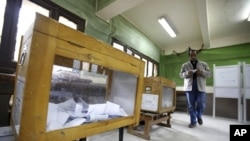Egypt is holding a second day of runoff elections for the national parliament, with rival Islamist parties engaging in increasingly heated competition for votes in the country's two largest cities and seven other provinces.
Voting for the 52 individual seats in Cairo, Alexandria and the other provinces began Monday and was due to end Tuesday. Twenty-four of the races are a contest between candidates from Egypt's two main Islamist groups: the Muslim Brotherhood's Freedom and Justice Party and the ultra-conservative Salafist Nour Party.
|
Major Alliances for Egypt's Parliamentary Elections Democratic Alliance for Egypt: Formed in June 2011, it was the first significant political coalition to emerge after President Hosni Mubarak's February resignation. The coalition is led by the Muslim Brotherhood's Freedom and Justice Party and includes at least five other political groups. The alliance started out as a broad-based coalition of liberal and Islamist parties but some of its original members left due to ideological differences. Islamist Alliance (Alliance for Egypt): Led by the Salafist party al-Nour and includes at least two other groups. Its members were originally part of the Democratic Alliance but split because of a disagreement over the number of candidates they would be able to field in the elections. The Islamist Alliance formed in late September. Egyptian Bloc: The liberal coalition has lost members since its formation in August and now includes only the Free Egyptians, Social Democratic and al-Tagammu parties. The bloc says it hopes to bring together political forces that are committed to a civil democratic state based on a principle of separation between religion and politics. Completing the Revolution Alliance: Formed in October, the alliance includes youth, socialist, liberal and moderate Islamist parties. Most were formerly part of the Egyptian Bloc. Members include the Revolutionary Youth Coalition, the Egypt Freedom Party and the Socialist Popular Alliance Party. |
Tensions high
Witnesses say tensions between the rival Islamist parties were high in some runoff districts, with Nour supporters ordering Brotherhood campaign workers to leave areas around polling stations. Egypt's military rulers have made polling station zones off limits to campaigners from all parties to try to ensure a fair vote.
The two Islamist parties are seeking to build on strong results from last week's party-list vote held at the same time as the first round of voting for individual candidates. Party-list results released Sunday put Freedom and Justice in the lead with 37 percent, with Nour in second place at 24 percent and the liberal Egyptian Bloc in third with 13 percent.
The Salafist party advocates a strict interpretation of Islam that calls for segregation of the sexes, the full veiling of women and a ban on alcohol. Nour's strong election results have worried many liberal Egyptians who see it as a threat to their civil liberties.
Human rights
U.S. Secretary of State Hillary Clinton said Tuesday Washington expects all "democratic actors" in Egypt to uphold universal human rights, including women's rights, and to allow free religious practice. She was speaking at a European forum in the Lithuanian capital, Vilnius.
Clinton also called on Egypt's military rulers to ensure that free and fair voting continues through the next election rounds and to "expeditiously" transfer "real authority" to a new civilian government. The military took control of Egypt after a popular uprising forced autocratic president Hosni Mubarak to quit in February.
Next stage
Egypt's remaining 18 provinces will join the voting for the lower house of parliament in two stages in the coming weeks. Elections for parliament's less-powerful upper house will begin in late January and finish in March.
Voter turnout for the runoffs appeared lower on Monday and Tuesday than for the first round of voting on November 28 and 29. Egypt's election committee also lowered its estimate of the first-round turnout from 62 percent to 52 percent.
Nour quit an electoral alliance with the Brotherhood before the vote and has given no sign of wanting to renew the partnership in parliament. The secretary general of the Brotherhood's FJP Saad el-Katatni told the Associated Press that his party will try to form a broad coalition that includes liberal groups and new Islamist factions.
The Brotherhood was officially banned for decades under Mubarak, but its members continued to engage in politics as independents while establishing a nationwide network of charities popular with millions of impoverished people.
Egypt's Salafists shunned politics in the Mubarak era but decided to compete for parliament after the country's new military rulers promised free elections.
Some information for this report was provided by AP, AFP and Reuters.




